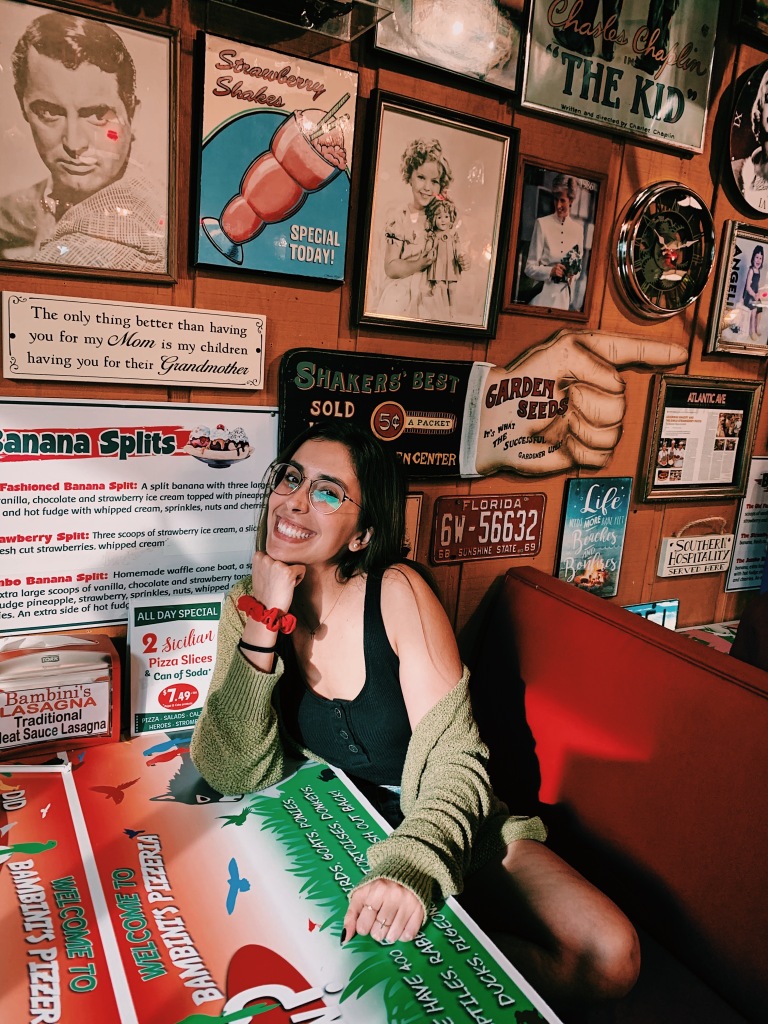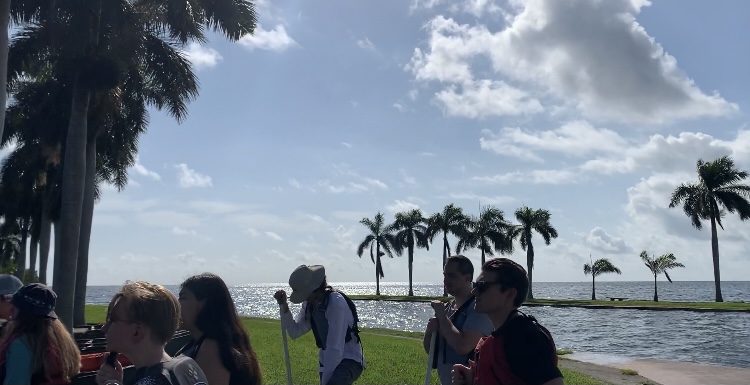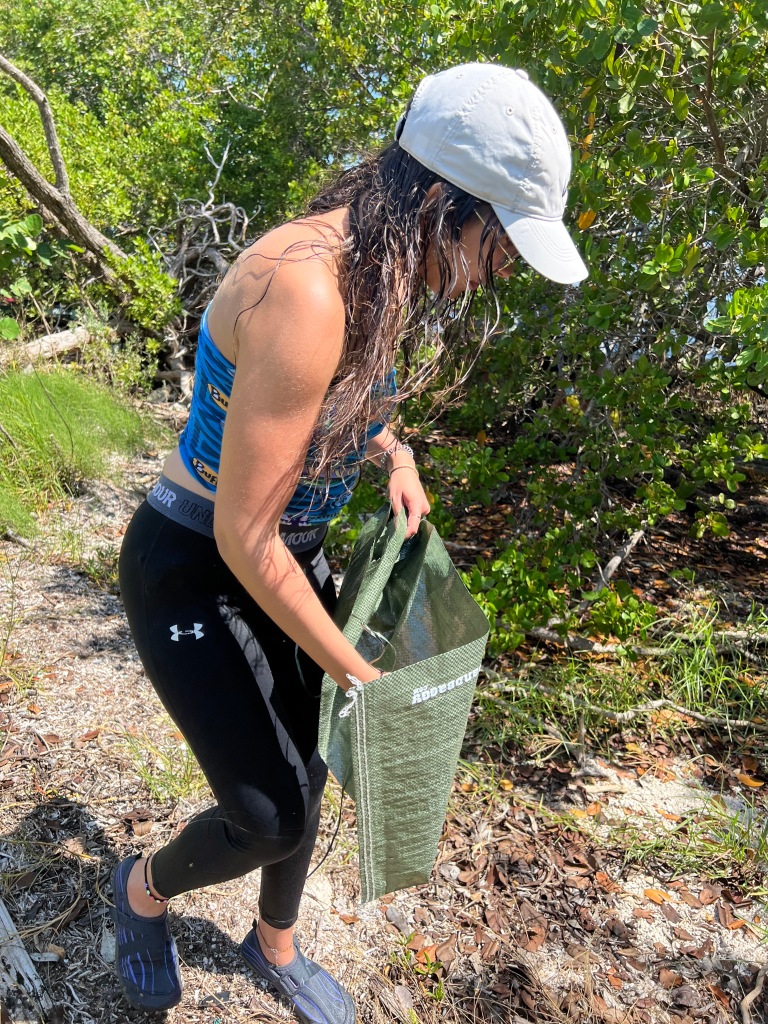STUDENT BIO

Ashley Sanchez is a Cuban American fourth-year student at Florida International University who was born and raised in Miami, Florida. She graduated with an Associates in Arts degree from Miami Dade College in 2018. After receiving her AA degree, she transferred to FIU in pursuit of a Bachelor of Science degree in Rehabilitation and Recreational Therapy. She is currently in the FIU Honors College and is part of the Pre-Therapy Student’s Association. She has also competed in several intramural sports at FIU including human foosball, volleyball, and kickball. She will begin applying to different graduate programs in the upcoming year to further her education in pursuit of becoming an Occupational Therapist. Ashley has a passion for adventure, sports, dancing and loves to spend quality time with her family and friends. This is her Miami Service Project.
WHO
This past October I had the opportunity to volunteer at the Deering Estate doing a Chicken Key Cleanup. The Deering Estate is located on the east coast of Florida near the Palmetto Bay area and serves as a historic site and museum. It is known for preserving the 1920’s era Miami estate of Charles Deering. Chicken Key is about one mile northeast of the Deering Estate. The island “…was formed by the deposition of quartz and limestone sands by ocean currents,” and “An 1899 survey by S. H. Richmond recorded a maximum elevation of three feet above sea level” (Deering Estate Natural Resources).

WHY
I took this opportunity as a chance to give back. Although it didn’t relate to my major, volunteering has always been something I am passionate about. As someone who wants to work in the healthcare field in the future, my passion is to give back to others and, in turn, to our community. Canoeing and being out in the water is something I have always enjoyed doing, and now I can add beach cleanups as another hobby on my list of interests because I enjoyed every minute of it.

HOW
I was given this amazing opportunity to participate in the Chicken Key Cleanup because I am enrolled in the course Miami in Miami. This course allows me to learn about the historical, social, and cultural identity of Miami in a complete immersive way.
It was an adventure from the minute my classmates and I arrived at the Deering Estate. While we made our way to the island, we took many photos and shared stories. It was a great way to bond and experience the outdoors. Although we were uncoordinated at first, we were able to find our rhythm and be one of the first groups to arrive at the island—not that it was a race or anything.
Doing a beach cleanup was something that I had been wanting to do for a while and being able to experience it with my classmates, while getting educated by Professor Bailly, was incredible. It definitely made me realize just how oblivious I was to the amount of debris that makes its way into our waterways and how it poses such an immense threat to marine life.
WHERE AND WHAT?
Our class started off with a debriefing given to us by Professor Bailly at the Deering Estate Boat Basin. We stood by the shoreline, canoes in front of us. We were then asked to get in pairs of two or three and choose a canoe.

We got to canoe into an area where the mangroves almost entirely blocked the entrance-way, yet, left enough room for us to paddle through it. As we paddled through the mangrove forest, branches with beautiful leaves reached over the water and tree branches poked at us almost as if they were asking for our attention. We learned about the importance of the mangroves to the ecosystem—how they help reduce hurricane impacts, provide shelter for many different marine organisms, and lastly, how their branches serve as nesting areas for birds.

Once we made it to Chicken Key, we docked the canoes by tying them to nearby mangrove trees and settled down in what looked like an outdoor campfire pit. From the minute I got off the canoe, I realized the amount of debris that was floating around the shoreline. Minutes after putting down our belongings, we rushed into the freezing water and then, had our lunch. Once we finished our meals, we each took a bag or two and split up to pick up as much debris as possible.

It was saddening to see the amount of bottle caps, styrofoam, glass, plastic, and bottles scattered around the island. Since I was mostly focusing on picking up the smaller items, I was only able to fill up one bag. The smaller objects are sometimes the most dangerous since the marine animals tend to think the items are food and they will swallow it. Before it was time to head back, we all got to meet and hold Mr. Krabs, one of the island’s hermit crabs.

WHEN

SUMMARY
There are some things that worked and some that didn’t. One thing that didn’t work at first, which I previously mentioned, was our paddling coordination. Another thing that didn’t go as I had planned it to was that I first picked up two trash bags to fill up, however, I was only able to fill up one. I definitely underestimated how much time it took to look for the small pieces of debris. I kept looking around at my classmates, discouraged, thinking I wasn’t trying hard enough. But, I had to keep reassuring myself that I was making just as much of an impact. What worked is how, collectively, we were able to fill up a substantial amount of biodegradable bags filled with debris that would have otherwise been harming the island and its marine life. Also, we were able to load the bags into a pickup truck and unload them into a dumpster where they would no longer be in harm’s way.
Even though it may seem like we are not making a big impact, each cleanup contributes to an overarching mission. Professor Bailly showed us a picture of what the island looked like before the cleanups and there were piles of debris all over. It was disheartening and eyeopening to see how careless we can be with the beautiful habitat we were created for. The habitat that is and always has been home for us from the beginning of time.
Not only did Professor Bailly give us the opportunity to do the cleanup, he was able to lecture throughout the experience. Knowledge is power and being able to learn about Chicken Key, the mangroves, Biscayne Bay, etc. will hopefully encourage us as students to educate others and become more active in protecting our ecosystem. This is an experience I will never forget and I hope to be back soon on Chicken Key collecting more debris.

Works Cited
Miami hiking trails: Beautiful parks in Miami for exploring. Deering Estate. (2021, September 17). Retrieved December 1, 2021, from https://deeringestate.org/miami-hiking-trails-parks/.